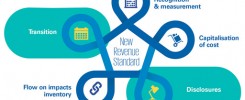Challenge
People can list many reasons why the government and regulators like STP reporting, such as to:
• improve efficiency in the current tax system;
• ensure fair payments for employees, and
• combat black market economy,
But one of the biggest challenges for the ATO would be how to provide the rest of the 650,000 Australian businesses with no-cost and low-cost Single Touch Payroll solutions as small employers (with 19 or fewer employees) or micro employers (with 1-4 employees) would normally prepare their payroll with a non-STP compliant software or in a very manual way.
In the Statement from Commissioner Chris Jordan on 13 February 2019, the following adjustments were offered:
• Micro employers using registered tax agents can report quarterly for the first two years instead of real-time reporting;
• No penalties for mistakes, missed or late reporting for the first year.
Future
Industry trends have indicated a reduction of time spent on compliance due to the improvements of Information Technology. But things like STP reporting and Transfer Balance Account Report reporting for Superannuation Funds indicates that we are moving towards a real time reporting regime, especially for tax authorities globally. This trend will inevitably increase the financial burdens on taxpayers and various risks associated with transmitting greater volume of data globally in the short run.
Data driven obligations will be pushed onto businesses and individual taxpayers, and as a result we might experience a shift from traditional tax returns with historical data, to real time reporting.
Lastly, it will become easier for the tax office to benchmark, profile and audit taxpayers with the great volume of data sent to them.
Should you have any queries about implementing STP reporting, please do not hesitate to contact our office.
Article written by Yu Zhang



